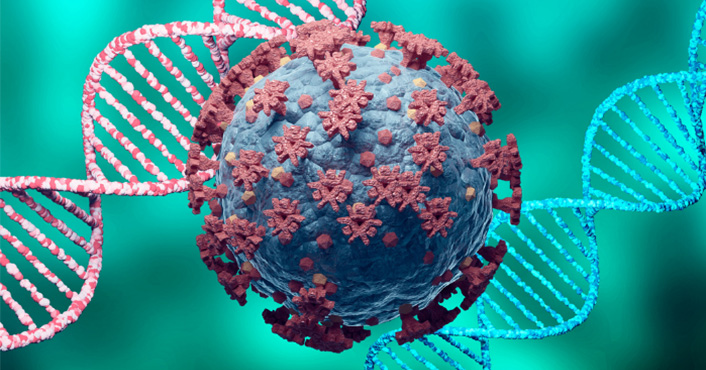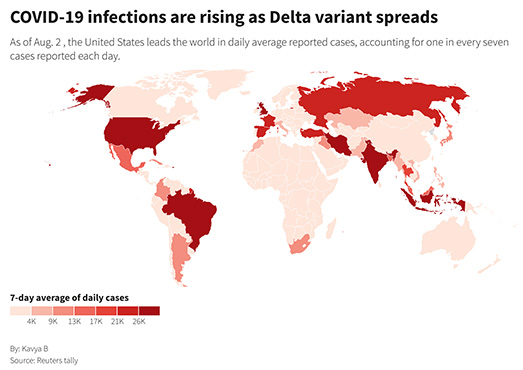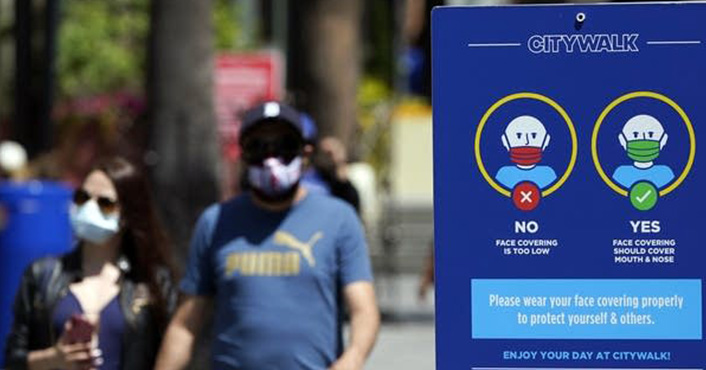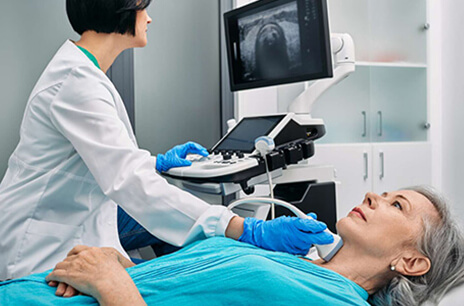The SARS-COV-2 Delta variant was among the first variants of the virus that causes COVID-19. This variant, also described as B.1.617.2, was first reported in India in October 2020.
The Delta variant soon became the dominant variant in over 130 countries during what is known as the Delta wave in the second half of 2021.(1)
But how did the Delta variant come about?
The coronavirus is a highly transmissible viral disease. As it spreads rapidly among populations, it mutates to adapt to new surroundings. This mutation helps the virus dodge the immune system of affected persons, providing better chances of reproducing and spreading faster from host to host. Virus mutations can also make existing treatments and vaccines less effective, especially against new infections and mild illnesses.(2)(3)
Upon discovering the enhanced transmission rate of the Delta wave, national and international health agencies like the CDC called for amplified COVID-19 vaccination coverage. They also advised those in high transmission areas to wear masks in indoor spaces frequented by the public. This masking directive applied also to those fully vaccinated for the coronavirus.
The agencies gave these guidelines following the emergence of data with worrying facts about the coronavirus Delta variant.

Facts About the Infection and Spread of the Delta Variant
Since its identification at the end of 2020, scientists have discovered the following facts about the infection and spread of the SARS-COV-2 Delta variant:
- The Delta variant caused a new rise in coronavirus infection cases, reversing the downward trend already realized with mass vaccination. The variant also triggered an increase in hospitalized cases.
- The Delta variant is more infectious, spreading more than twice as fast as other variants and recording increased transmissibility, even to those already vaccinated.
- The Delta variant causes severe illness in unvaccinated individuals compared to those already vaccinated. Patients with the variant are also more likely to be hospitalized, be admitted to the ICU, or die.(4)
- Although vaccines were less effective against infection during the Delta wave, they were effective against symptomatic illness, hospitalization, and death. The low protection of the vaccines against infection caused an increased case burden during the Delta wave.
- Vaccinated people with breakthrough Delta variant infections have the same viral load peak periods as those unvaccinated and can transmit the virus. However, they have a faster viral clearance rate, reducing their time of transmission when compared to the unvaccinated infected cases.(5)

How is the Delta Variant Different from the Original Coronavirus?
Apart from its higher transmissibility rate, the Delta variant shows similar general symptoms as the original coronavirus:
- Body and muscle aches
- Fever and chills
- Runny nose (congestion)
- Cough
- Sore throat
- Headache
- Difficulty breathing
- Feeling fatigued
- Nausea or vomiting
- Diarrhea
- Loss of taste or smell(6)
However, the Delta variant does not seem to present a cough and the loss of taste and smell as often as the original coronavirus.(6)
Also, those infected with the Delta variant become sicker faster because the variant virus multiplies rapidly in the respiratory tract.
Protecting Yourself and Others from the Delta Variant
To protect yourself and others from the Delta variant, follow these preventive measures:
- Always wear a maskin public places or when indoors in enclosed, crowded, and poorly ventilated spaces.
- Keep a safe distancefrom those around you, at least 6 feet.
- Observe respiratory etiquetteby covering your sneeze and cough.
- Wash your hands frequentlywith soap and running water or use a 70% alcohol-based hand sanitizer when water and soap are unavailable.
- Get vaccinatedand stay up to date with booster doses.
- Avoid public placesand stay at home when sick.
- Take a COVID-19 testif you experience some or all the symptoms listed above or following exposure to the coronavirus.

Additional Notes on Preventing the Spread of the Delta Variant
All authorized coronavirus vaccines are highly effective in preventing severe illness and death from the SARS-COV-2 Delta variant.
Nonetheless, these vaccines are not 100% effective.
As such, even fully vaccinated persons are prone to breakthrough coronavirus infection. They will show symptomatic disease and can infect others. However, the vaccine gives them more protection against severe illness and death.
Conclusively, vaccines play the primary role in the prevention of coronavirus transmissibility and the proneness of individuals to severe disease and death. Nevertheless, the protection from COVID-19 vaccines is more effective when boosted with the preventative measures listed above, including masking, social distancing, hand hygiene, and taking a COVID test.
Is the COVID Delta Variant Still Circulating?
The WHO declared the end of the global coronavirus emergency as a pandemic on May, 5th 2023. While that does not mean the virus is over, it does mean that the transmission curve for some of the variants is flattened, including the Delta variant.
In fact, as of January 2024, the Delta variant is not listed by the WHO among the Variants of Monitoring, Variants of Interest, or Variants of Concern.(8)
Instead, the SARS-CoV-2 JN.1 is the variant with a notable circulation rate today, both in the U.S. and globally.(9)
REFERENCES
1.Atherstone CJ, Guagliardo SJ, Hawksworth A, et al. COVID-19 Epidemiology during Delta Variant Dominance Period in 45 High-Income Countries, 2020–2021. Emerging Infectious Diseases. 2023; 29(9): 1757-1764. doi:10.3201/eid2909.230142.
2.WHO. Coronavirus disease (COVID-19):
Variants of SARS-COV-2.
This is a block of text. Double-click this text to edit it.
4.Bast E, Tang F, Dahn J, Palacio A. Increased risk of hospitalisation and death with the delta variant in the USA. Lancet Infect Dis. 2021;21(12): 1629-1630. doi:10.1016/S1473-3099(21)00685-X.
5.Singanayagam, A. Hakki, S., Dunning, J., Madon, K.J., Crone, M.A., Koycheva, A. et al.
Community transmission and viral load kinetics of the SARS-CoV-2 delta (B.1.617.2) variant in vaccinated and unvaccinated individuals in the UK: a prospective, longitudinal, cohort study. 2022; 22(2): 183-195.
7. Samieefar N, Rashedi R, Akhlaghdoust M, Mashhadi M, Darzi P, Rezaei N. Delta Variant: The New Challenge of COVID-19 Pandemic, an Overview of Epidemiological, Clinical, and Immune Characteristics. Acta Biomed. 2022; 93(1):e2022179. doi:10.23750/abm.v93i1.12210.






